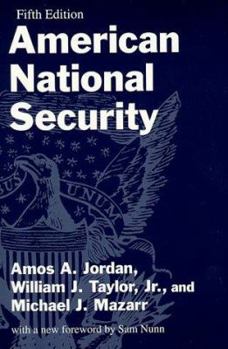American National Security
Select Format
Select Condition 
Book Overview
The sixth edition of American National Security has been extensively rewritten to take into account the significant changes in national security policy in the past decade. Thorough revisions reflect a... This description may be from another edition of this product.
Format:Paperback
Language:English
ISBN:0801859840
ISBN13:9780801859847
Release Date:November 1998
Publisher:Johns Hopkins University Press
Length:640 Pages
Weight:1.95 lbs.
Dimensions:1.6" x 5.9" x 9.2"
Customer Reviews
2 ratings
A dangerous world we live in...
Published by Thriftbooks.com User , 19 years ago
In times of living in a dangerous world torn apart by hatred and mistrust and terrorism it is the responsibility of the government to protect the life of its individual citizens as well go out of the way to honor and provide benefits to those brave souls who put themselves and their families on the line for the common good of their fellow citizens. The approach to terrorism should be at least two-pronged: 1.Zero tolerance of any identified and confirmed terrorist targets and complete sealing of the borders. It is the responsibility of the government to provide ample resources to the border states for police patrolling along with technology for closely watching and preventing infiltration of illegal aliens. "Neighborhood watches", though well intended and entrenched in values of patriotism and love of the nation and the noble cause of looking out for fellow citizens, can sometimes go horribly wrong. If one believes in sanctity of every human life (grounded in both American values as well as religious values) then the risk of such an endeavor going awry is probably unacceptably high though debatable. The government must be directly (or indirectly by way of state governments) take in its own hands this enormous responsibility. A fiscally conservative government must accomplish this at all costs - no cost of protecting the lives of its citizens is too high. 2.Identify the sources of terrorism - the breeding ground for extreme religious ideologies in developing or socially narrow minded nations - which when combined with hunger and poverty and misinformation by some media and government sponsored propaganda available to them is a dangerous and potentially a volatile source of terrorism. This can be approached by providing humanitarian aid to those organizations in such areas of the world which provide a culture of trust towards the developed world and encourage growth of educational institutions in these countries as well. Also "friendly" countries in volatile areas of the world have a responsibility to allow media from the developed world to provide an alternate viewpoint on controversial issues - that is the least they can do towards bringing people of the world together. Also it is critically important to revamp the national intelligence gathering agencies that should directly communicate with a given office within homeland security and can get quick approval in cases where preemption against terrorist targets could be justified. Further the infrastructure of these intelligence agencies should be absolutely and totally under the direct control of the government agencies and not be potentially vulnerable to foreign influences. A healthy discussion on these issues is long overdue.
The Fundamentals of Foreign Policy & Strategy
Published by Thriftbooks.com User , 22 years ago
This book serves its purpose well. It clearly walks the reader through elements of national security, the actors, processes, and how Americans have traditionally approached it. With a unique perspective on the military element of power, the book also covers regional security issues and early twenty first century topics. As a senior level undergraduate text or as a basis to launch into discussion in graduate level seminars, American National Security conveys the fundamentals of U.S. security policy in a clear, articulate manner. Jordan and Taylor both taught in the Department of Social Sciences at West Point in the early 1970's. Mazaar joined them for the 5th edition after directing the Millennium Project at the Center for Strategic and International Studies. The book was designed to convey the basics of policy and process in American national security. The fifth edition is currently in use at the Army's Command & General Staff College for officers at the rank of major enrolled in strategic studies. It serves well as a foundation to discuss national security strategy and policy.The book has two weaknesses. It is due for a revision given the dynamic nature of the post Cold War environment, especially since 9/11. It also lacks the standard amount of pictures, graphs and charts that normally accompany today's college texts. The book contains all black and white text with limited charts, maps and cartoons. Although this has not been a problem at the master's level, it could be perceived as a drawback to generating undergraduate interest in the subject matter. Notwithstanding the above criticism, Taylor, Jordan and Mazaar have created a text that lays out the basics of national security policy, actors and institutions. Highly recommended.





